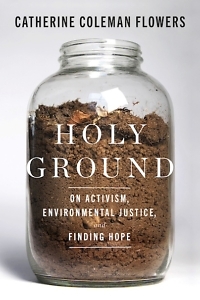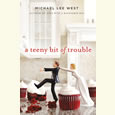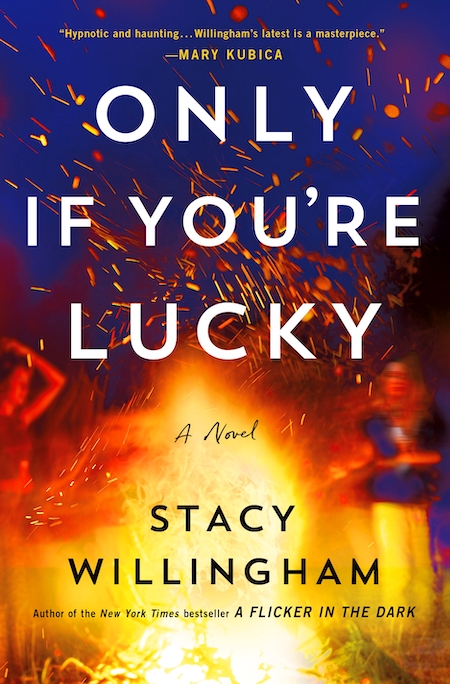The Good Fight
Faith sustains activist Catherine Coleman Flowers amid the rural South’s water wars
In the firm hands of Catherine Coleman Flowers, environmental, social, and racial justice aren’t separate strands of work that must be done, but rather parts of a whole that stretches back generations. Her essay collection, Holy Ground: On Activism, Environmental Justice, and Finding Hope, reveals an activist who knows what it takes to get things done.

When we speak of water, we often speak on grand scales — the condition of the oceans or the vast amounts of water wasted to cool artificial intelligence data centers. But for more than two decades, Flowers has been fighting to address another kind of outsize water problem: basic sanitation in poor rural communities. As she testified at a Senate subcommittee hearing in 2023, 18% of all United States households are unable to send their sewage to a centralized wastewater system. That’s almost one in five homes.
Flowers elevated the issue to a national stage with her 2020 memoir, Waste: One Woman’s Fight Against America’s Dirty Secret. Her second book, Holy Ground, is a collection of essays on her continued work in this area and, more broadly, on the failing infrastructures in rural Southern communities, especially predominantly Black communities, and how climate change exacerbates these problems. Alongside these crises, she writes about gun control, reproductive rights, school meals, regenerative farming, and more.
A recipient of a MacArthur “genius” grant, Flowers is the director of the Center for Rural Enterprise and Environmental Justice, and she was appointed vice chair of the White House Environmental Justice Advisory Council in 2021. For Flowers, this work is the family business; after the Civil Rights Act of 1964 passed and the Voting Rights Act became law, her family’s community in Montgomery became one of the critical locations for the Student Nonviolent Coordinating Committee, or SNCC. Her environmental justice work is a continuation of her family’s legacy of civil rights advocacy.
Lowndes County, Alabama, where her father is from, bears the nickname “Bloody Lowndes” for its violent, racist history, but Flowers characterizes her community by its heroes and gamechangers. She describes how the fierce feline symbol of the Black Panther Party originated there in 1966. And the collection’s titular essay, about the Holy Ground battle site from the Creek War, is a loving piece about discovering a profound spiritual connection with the land alongside its complicated history.
 Flowers’ own ferocity comes in a torrent from the opening essay, “Thirty Pieces of Silver.” It’s our first look at how her faith informs her work, and she is precise in her indictments. She considers the deal that Judas struck to betray Jesus for a small fee: “Those pieces of silver have become a compelling metaphor for many of the harms inflicted on innocent people because of the enormous profits a very few enjoy,” she writes. “I despair as I watch once-trusted elected officials, once-revered members of the judiciary, or once-respected religious leaders wrap themselves in rectitude as they sell out people who are less fortunate.”
Flowers’ own ferocity comes in a torrent from the opening essay, “Thirty Pieces of Silver.” It’s our first look at how her faith informs her work, and she is precise in her indictments. She considers the deal that Judas struck to betray Jesus for a small fee: “Those pieces of silver have become a compelling metaphor for many of the harms inflicted on innocent people because of the enormous profits a very few enjoy,” she writes. “I despair as I watch once-trusted elected officials, once-revered members of the judiciary, or once-respected religious leaders wrap themselves in rectitude as they sell out people who are less fortunate.”
“This Is What Disinvestment Looks Like” is equally powerful in its depiction of the water problems in Jackson, Mississippi. Flowers describes the state’s predominately Black capital city as “the embodiment of neglect, of a collapsing infrastructure, of environmental injustice at its most extreme.”
To continually fight across political battle lines is to wring yourself dry, and much of Holy Ground offers a measured peek into Flowers’ methods for sustaining herself. Primarily, her wellspring is her faith, even after the worst loss imaginable: the death of her mother, murdered with a gun. But Flowers’ grief does not overflow onto the page. Instead, she looks for inspiration in the leadership of young people such as State Representatives Justin Jones and Justin Pearson, whose persistence in the aftermath of the Covenant School shooting in Nashville was met with the “breathtaking racism and cynicism of Republican lawmakers in Tennessee.”
Throughout the collection, there is one source of hope that feels most hard-won: a belief that redemption is available to everyone. “Even people whose names [are] synonymous with bigotry can change,” she writes. She offers several examples of this, such as Nazi rocket scientist Wernher von Braun and Alabama Governor George Wallace, whose 1963 inaugural address she quotes: “Segregation now. Segregation tomorrow. And segregation forever.” But by 1995, Wallace was welcoming civil rights marchers to Montgomery. Flowers acknowledges that a younger version of herself never could’ve stomached such an argument, but she’s displaying some political shrewdness here. To make the changes she wants to see, she must believe that even the smallest moments of connection may lead to reform.
To work this hard and fight this hard, you must be sustained by strong stuff. For Flowers, that is her community, her faith, and her family. This is the kind of book you write when you’re using your narrative to build bridges so you can help someone else across.

Formerly an editor at BookPage, Cat Acree is a writer and commercial pilot based in Nashville.


